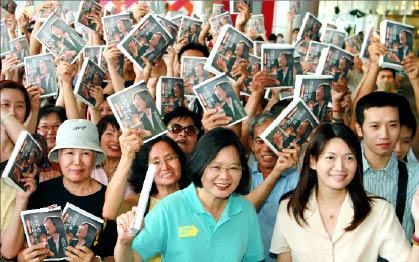Democratic Progressive Party (DPP) Chairperson Tsai Ing-wen (蔡英文) holds a slight lead over President Ma Ying-jeou (馬英九) in both a head-to-head scenario and a possible three-way race, according to the latest survey, and Tsai would likely win the January presidential election if economic issues were voters’ top concern, analysts said in a forum yesterday.
A public opinion poll, conducted on Friday and Saturday by the Taiwan Brain Trust think tank, found that 35.9 percent of respondents would vote for Tsai, while 32.2 percent would vote for Ma and 13.7 percent would support People First Party Chairperson James Soong (宋楚瑜) in a three-way race.
Tsai also leads Ma with 40.1 percent versus 37.3 percent in a head-to-head battle, according to the survey.

Photo: Chang Chung-yi, Taipei Times
While Tsai’s campaign has been hurt by a series of allegations about her running mate Su Jia-chyuan’s (蘇嘉全) farmhouse in Pingtung County, it appeared she had more than made up for it during her 11-day campaign trip on the west coast, said Chen Jin-ji (陳錦稷), director of the Taiwan Brain Trust’s poll center, adding that Ma’s re-election campaign has suffered devastating blows because of his peace agreement proposal.
Tsai enjoys a large lead in southern Taiwan in a head-to-head battle, leading Ma by 17.9 percentage points in Yunlin, Chiayi and Greater Tainan, and 27.2 percentage points in Greater Kaohsiung and Pingtung, the survey showed.
She also holds the advantage among voters in the 20-39 age group, with a 15.4 point lead in the 20-29 age bracket, and leads by 7.6 points in the 30-39 bracket.
Despite Tsai trailing among female voters by 3.6 percentage points, the poll result is the best ever performance for any DPP presidential candidate, Taiwan Brain Trust chief executive Lo Chih-cheng (羅致政) said.
Economic voting behavior was one of the most crucial reasons contributing to the DPP’s landslide loss in the 2008 presidential election, as financially challenged voters tend to favor a change in government, said Kenneth Lin (林向愷), an economics professor at National Taiwan University.
If that theory applies in the upcoming election, Lin said, the same things could happen again because most of the respondents were not happy with the economic performance of the Ma administration and said they were pessimistic about Taiwan’s economic prospects.
The same survey found that more than half of the respondents are unhappy with Ma’s -performance on fighting the increasing wealth gap, unemployment and commodity prices, with 57.1 percent saying they were not satisfied with Ma’s economic performance and 56.9 percent saying Ma favored big business.
More than 70 percent of respondents described the nation’s unemployment situation as “serious” or “very serious” and 53.5 percent are concerned about losing jobs or being forced to take unpaid leave within the next six months.
“Countries around the world are suffering from economic downturns and turbulence. However, what concerns me the most is that, unlike other countries, expectations for the future have been lacking among Taiwanese,” Taiwan Brain Trust founder and former presidential adviser Koo Kwang-ming (辜寬敏) said.
That is why a regime change seems inevitable, he said, especially after Soong’s entry into the presidential election.
“From what I’ve seen, Ma has had no hope of being re-elected since Soong made his bid official,” Koo said.
The poll collected 1,071 samples with a 3 percent margin of error.

Taiwan is stepping up plans to create self-sufficient supply chains for combat drones and increase foreign orders from the US to counter China’s numerical superiority, a defense official said on Saturday. Commenting on condition of anonymity, the official said the nation’s armed forces are in agreement with US Admiral Samuel Paparo’s assessment that Taiwan’s military must be prepared to turn the nation’s waters into a “hellscape” for the Chinese People’s Liberation Army (PLA). Paparo, the commander of the US Indo-Pacific Command, reiterated the concept during a Congressional hearing in Washington on Wednesday. He first coined the term in a security conference last

A magnitude 4.3 earthquake struck eastern Taiwan's Hualien County at 8:31am today, according to the Central Weather Administration (CWA). The epicenter of the temblor was located in Hualien County, about 70.3 kilometers south southwest of Hualien County Hall, at a depth of 23.2km, according to the administration. There were no immediate reports of damage resulting from the quake. The earthquake's intensity, which gauges the actual effect of a temblor, was highest in Taitung County, where it measured 3 on Taiwan's 7-tier intensity scale. The quake also measured an intensity of 2 in Hualien and Nantou counties, the CWA said.

The Overseas Community Affairs Council (OCAC) yesterday announced a fundraising campaign to support survivors of the magnitude 7.7 earthquake that struck Myanmar on March 28, with two prayer events scheduled in Taipei and Taichung later this week. “While initial rescue operations have concluded [in Myanmar], many survivors are now facing increasingly difficult living conditions,” OCAC Minister Hsu Chia-ching (徐佳青) told a news conference in Taipei. The fundraising campaign, which runs through May 31, is focused on supporting the reconstruction of damaged overseas compatriot schools, assisting students from Myanmar in Taiwan, and providing essential items, such as drinking water, food and medical supplies,

New Party Deputy Secretary-General You Chih-pin (游智彬) this morning went to the National Immigration Agency (NIA) to “turn himself in” after being notified that he had failed to provide proof of having renounced his Chinese household registration. He was one of more than 10,000 naturalized Taiwanese citizens from China who were informed by the NIA that their Taiwanese citizenship might be revoked if they fail to provide the proof in three months, people familiar with the matter said. You said he has proof that he had renounced his Chinese household registration and demanded the NIA provide proof that he still had Chinese